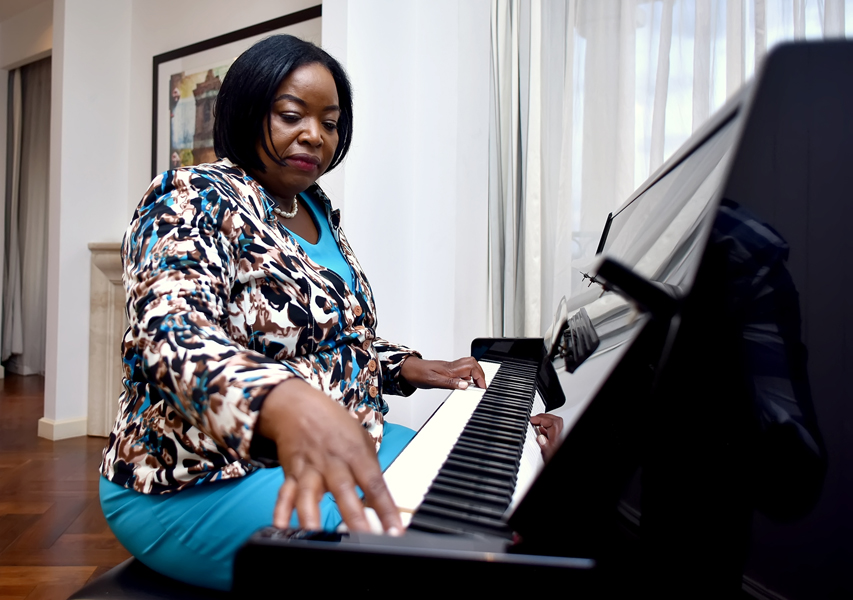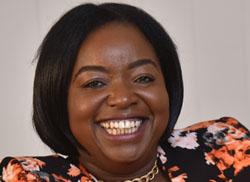
Cabinet Secretary in the Ministry of Foreign Affairs, Monica Juma comes with a mile-long pedigree in the Peace and Security arena, having previously served as Principal Secretary, Foreign Affairs and in the same capacity in Defence – not to mention having served as Kenya’s ambassador to Ethiopia and Djibouti, and Permanent Representative to AU, IGAD and UNECA. Harry S. Truman might well have had Ambassador Dr Monica Juma in mind when he remarked, “Not all readers are leaders, but all leaders are readers.” Dr Juma is not only well read, she has also emerged as a true leader in a blossoming career straddling across academia, policy research, diplomacy and hands-on government administration.
As a child, Juma was exposed to diverse Kenyan cultures as her parents were transferred from place to place in the course of their professional duties. She attended primary and secondary schools in Nairobi, Mombasa, Nakuru, Meru and Western regions. She believes this exposure sharpened her aspirations for high achievement. “It was obvious there was something calling for me. I enjoyed schooling and it was never a struggle,” she recalls. By the time she started her undergraduate studies at the University of Nairobi, she knew she would be pursuing her master’s degree. “By the time I started my master’s, I knew I would go on to do my PhD,” she adds. After graduating from the University of Nairobi with a BA in Government, most of her classmates opted to take up positions as District Officers (DOs), but she chose to work in the Office of the President. She recalls that it was a fascinating experience examining the organisational needs of the government. “We embarked on setting up new structures that would facilitate service delivery. For example, I played a role in establishing the Kenya Pesticide Control Board,” she says.
After this stint of service in the Office of the President, Juma decided to move to Moi University as a graduate assistant. Since it was a new university facing various teething problems, including understaffing, she found herself stretched beyond her level of experience, yet remained undaunted. “I saw it as an opportunity to learn and showcase my skills, and so I ran with it.” It was during this period, in 1991, that President Siad Barre of Somalia was overthrown. Consequently, refugees started flowing into Kenya in large numbers. “This was a new phenomenon, and as academicians we sensed there was a need to come up with a refugee centre in the university.” The refugee centre would serve as a resource centre to the Government and academic community on policies, reception and protection of refugees. Juma was therefore ecstatic when she learned that she had been nominated to undertake Refugee Studies as a fellow at Oxford University. “After my studies in the United Kingdom I came back and worked with a team that helped set up the Centre for Refugee Studies at Moi University,” she explains. She was appointed Research Director, a position that required close collaboration with government and non-governmental organisations. “This was a new and very exciting area for those in the policy world,” she recalls.
What started as a personal career pursuit soon grew in dimension as she and others engaged with various stakeholders over what was emerging as a regional issue. “We eventually helped establish refugee studies centres at the University of Dar es Salaam in Tanzania and Makerere University in Uganda.” Today the centres are still running and thriving, an achievement she is justifiably proud of.

Juma would later head back to Oxford University to pursue a Doctor of Philosophy degree. While on this scholarship she travelled extensively, collaborating with leading international organisations. Her research took her to Uganda, Tanzania, Norway and Switzerland, among other countries. “I had the best time of my life. I enjoyed learning and interacting with intellectuals from different parts of the world,” she says. Upon completion of her graduate studies, Juma was invited to join one of the United Nations (UN) think tanks on international peace and security, at the time referred to as International Peace Academy (IPA) and later renamed the International Peace Institute (IPI). The think tank was created to advise on peace and security issues, and her job was to focus on the Africa programme. One of the reasons she joined IPA was because most donor agencies had started doubting Africa’s ability to rise from its various challenges, and had consequently started cutting back on their funding. She was assigned the task of looking into how the Ford Foundation could guarantee grant making (awarding of grants) in Africa, especially with regard to building capacity for crisis prevention.
Juma therefore embarked on research that covered 18 Sub-Saharan countries, and from that exercise it was determined that the Ford Foundation, or any other interested donor organisation, should first build capacity internally within the continent. This project led to the establishment of TrustAfrica based in Dakar, Senegal to build the capacity of African institutions to respond to crises. This was the precursor to the African Peace and Security Architecture (APSA), an African Union body focusing on prevention, management and resolution of crises and conflicts, post-conflict reconstruction and development in the continent. Juma later moved to South Africa where she worked for an organisation known as Safer Africa as a Senior Policy Analyst. The organisation played a big role in the transition of the Organisation of African Unity (OAU) to the African Union (AU) in 2001. She later moved to the Africa Institute of South Africa (AISA) where she served as Executive Director. AISA was a centre for excellence that was pushing for the African renaissance agenda; here she led policy research on African affairs.
One of her best experiences was being able to work with the South African National Defence Force to promote the adoption of gender balance. “This undertaking involved negotiating with the UN and as a result, South Africa currently observes gender balance on its peace missions,” she is gratified to note. She left AISA in April 2010 after being appointed to the position of Ambassador of Kenya to Ethiopia and Djibouti, and Permanent Representative to the AU, Intergovernmental Authority on Development (IGAD) and United Nations Economic Commission for Africa (UNECA). “I went to Addis (Ababa) when Kenya had just joined the Peace and Security Council,” she explains. She further clarifies that this was also the period when Kenya was looking to strengthen bilateral relations with Ethiopia.
“I enjoyed serving as a diplomat, and after a year of service the Kenya Defence Forces (KDF) moved into Somalia under Operation Linda Nchi.” Society will not benefit if it has fully empowered women with fully disenfranchised men or vice versa.
Her office became the reference point in the region on matters of regional peace and security. Their key achievements included chairing the Peace and Security Council thrice, and the integration of KDF into the African Union Mission in Somali (AMISOM). “We also negotiated signing of special status agreement with Ethiopia where Kenya would get 4,400 megawatts of electricity from Ethiopia,” she says. Juma served as ambassador for a total of three and a half years before her appointment as Permanent Secretary in the Ministry of Defence in 2013. “I have had a very interesting journey, from my beginnings as an academician, to policy adviser and now to government practitioner,” she says, expressing gratitude for the good fortune of having had all these opportunities in her lifetime.
She does, however, admit that her biggest weakness is always wanting to do more than she can. “Everywhere I look I see something I could be doing.” At the Ministry of Defence, for example, she felt the need for a big project that would push for more qualified women in the Kenya Defence Forces.
Her career trajectory may seem to suggest that she is all work and no play, but this is certainly not the case. “I enjoy cooking, travelling and reading widely.” She remembers with nostalgia her younger, more athletic days, when she played squash all the way up to graduate school. Nowadays, she swims occasionally to keep fit. Juma has learned to encourage herself when confronted by challenges. “For every problem, there is always a solution,” she insists. She acknowledges the impact various individuals have had in shaping her career, especially her father whose counsel she considers “limitless”. Through the years, the Ambassador has been actively involved in charity work. In particular, she supports a secondary school in her home area where she taught after completing her high school education. Her support of this school has left an indelible mark. The school was located in a very impoverished area and served students from destitute families. Juma did her best to give back and provide mentorship. She is now pleased to see the ripple effect where former students, who are now productive citizens, have in turn gone back to mentor and help others.
On the gender debate, Juma advises: “If we empower girls and disempower boys, women will have to play both male and female roles and thus carry the burden of society.” She notes that the goal should be to ensure that all human beings achieve their full potential. “Society will not benefit if it has fully empowered women with fully disenfranchised men or vice versa.” She adds that the stability and prosperity of Kenya is dependent on the wellbeing of the society in its totality.
As a wife and proud mother of two lovely daughters, Juma describes her entire family as being very supportive. She describes her girls as very outspoken and definitive in what they want to achieve. “In many ways they carry a spark of my spirit when I was growing up.” She describes her husband, Peter Kagwanja, as a man with a great mind and a thirst for knowledge.
